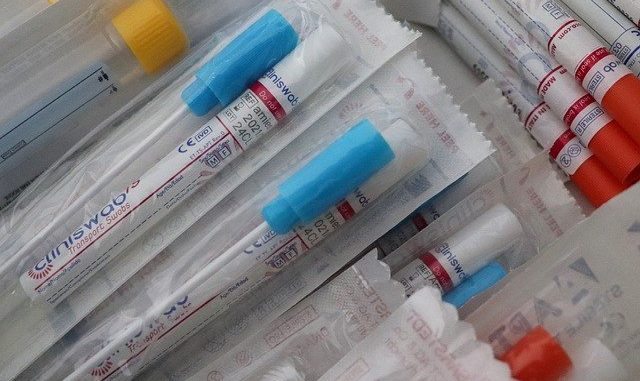
The Government is expanding Coronavirus testing facilities for essential workers across the country.
Those eligible for testing are essential workers who have Coronavirus symptoms or those living with an essential worker and showing Coronavirus symptoms.
The Kent & Medway Clinical Commissioning Group is not testing anyone who does not show Coronavirus symptoms.
Advice is to get tested in the first three days of coronavirus symptoms appearing, although testing is considered effective up until day five.
Most health and care essential workers will be tested by local testing centres. The majority of these are located at major hospitals across Kent and Medway such as the QEQM in Margate. Other essential workers will normally be tested through the national testing programme, either by post or at the new centre in Ebbsfleet.
There is some flexibility for all essential workers to use either route if necessary, subject to local testing capacity.
The Kent and Medway CCG is also working with partners on possible additional testing sites in the region, including mobile testing, and The isle of Thanet News understands one of these is set up in the grounds of the Royal Harbour Academy by the Marlowe Business Centre.
Details on how tests need to be booked via the Kent & Medway advice link here
The government announcement yesterday (April 28) also says anyone in England with symptoms of coronavirus who has to leave home to go to work, and all symptomatic members of the public aged 65 and over, will now be able to get tested.
This will mean people who cannot work from home and those aged 65 and over can know for sure whether they have coronavirus and need to continue isolating.
Members of their households with symptoms – a new continuous cough or high temperature – will also be eligible for testing.
Anyone eligible can book a test using the online portal here.
The government also announced that NHS staff, care home staff and care home residents will be eligible for testing whether or not they have symptoms.
Working with Public Health England, the Care Quality Commission and the Association of Directors of Adult Social Services, the government is piloting sending packages of ‘satellite’ test kits directly to care homes across England to enable testing of residents.
There are now more than 40 drive-through testing sites across the country, and, by the end of the week, 25,000 home testing kits will be available for ordering every day.
List of essential workers and those prioritised for CCG testing
- all NHS and social care staff, including:
- doctors, nurses, midwives, paramedics, social workers, care workers, and other frontline health and social care staff including volunteers
- the support and specialist staff required to maintain the UK’s health and social care sector
- those working as part of the health and social care supply chain, including producers and distributors of medicines, and medical and personal protective equipment
- NHS Blood and Transplant frontline staff (blood donation staff, specialist nurses for organ donation, staff running therapeutic apheresis services in NHS hospitals)
- those providing ancillary support to NHS workers (such as hotel accommodation for NHS staff)
Essential public services staff, including:
- prisons, probation, courts and tribunals staff, judiciary
- religious staff
- charities and workers delivering critical frontline services
- those responsible for the management of the deceased
- journalists and broadcasters covering coronavirus or providing public service broadcasting
- public health and environmental staff, such as specialist community public health nursing
- public safety and national security staff, including:
- police and support staff
- Ministry of Defence civilians, contractors and armed forces personnel (those critical to the delivery of critical defence and national security outputs and critical to the response to the coronavirus pandemic), including defence medical staff
- fire and rescue service employees (including support staff),
- National Crime Agency staff, those maintaining border security, prison and probation staff and other national security roles, including those overseas
- British Transport Police and the Maritime and Coastguard Agency
Transport workers, including:
- those who keep the air, water, road and rail passenger and freight transport modes operating during the coronavirus response
- those working on transport systems through which supply chains pass
Education and childcare workers, including:
- support and teaching staff
- social workers
- specialist education professionals
Critical personnel in the production and distribution of food, drink and essential goods, including:
- those involved in food production, processing, distribution, sale and delivery
- those critical to the provision of other essential goods, such as medical supply chain and distribution workers, including community pharmacy and testing (such as PHE labs), and veterinary medicine
- workers critical to the continuity of essential movement of goods
Others
- local and national government staff critical to the effective delivery of the coronavirus response, or delivering essential public services, such as the payment of benefits
- public and environmental health staff, including in government agencies and arm’s length bodies
- funeral industry workers
Frontline local authority staff and volunteers, including
- those working with vulnerable children and adults, victims of domestic abuse, and the homeless and rough sleepers (and hotel staff supporting these groups)
- voluntary sector organisations providing substance misuse treatment
Utilities, communication and financial services staff, including:
- staff needed for essential financial services provision (including but not limited to workers in banks, building societies and financial market infrastructure)
- the oil, gas, electricity and water sectors (including sewerage)
- information technology and data infrastructure sector and primary industry supplies to continue during the coronavirus response
- essential staff working in the civil nuclear, chemicals, telecommunications (including but not limited to network operations, field engineering, call centre staff, IT and data infrastructure, 999 and 111 essential services), postal services and delivery, payments providers and waste disposal sectors

